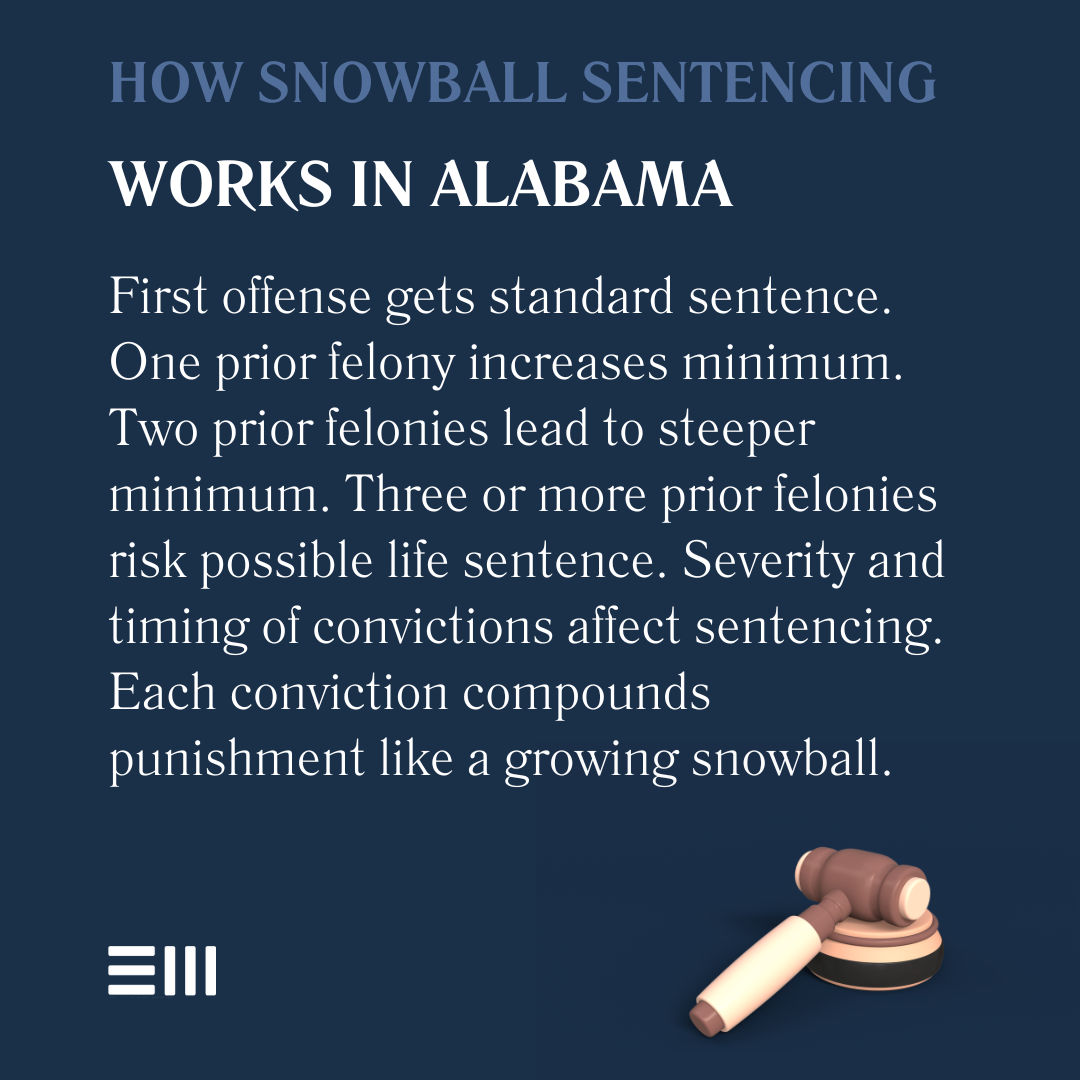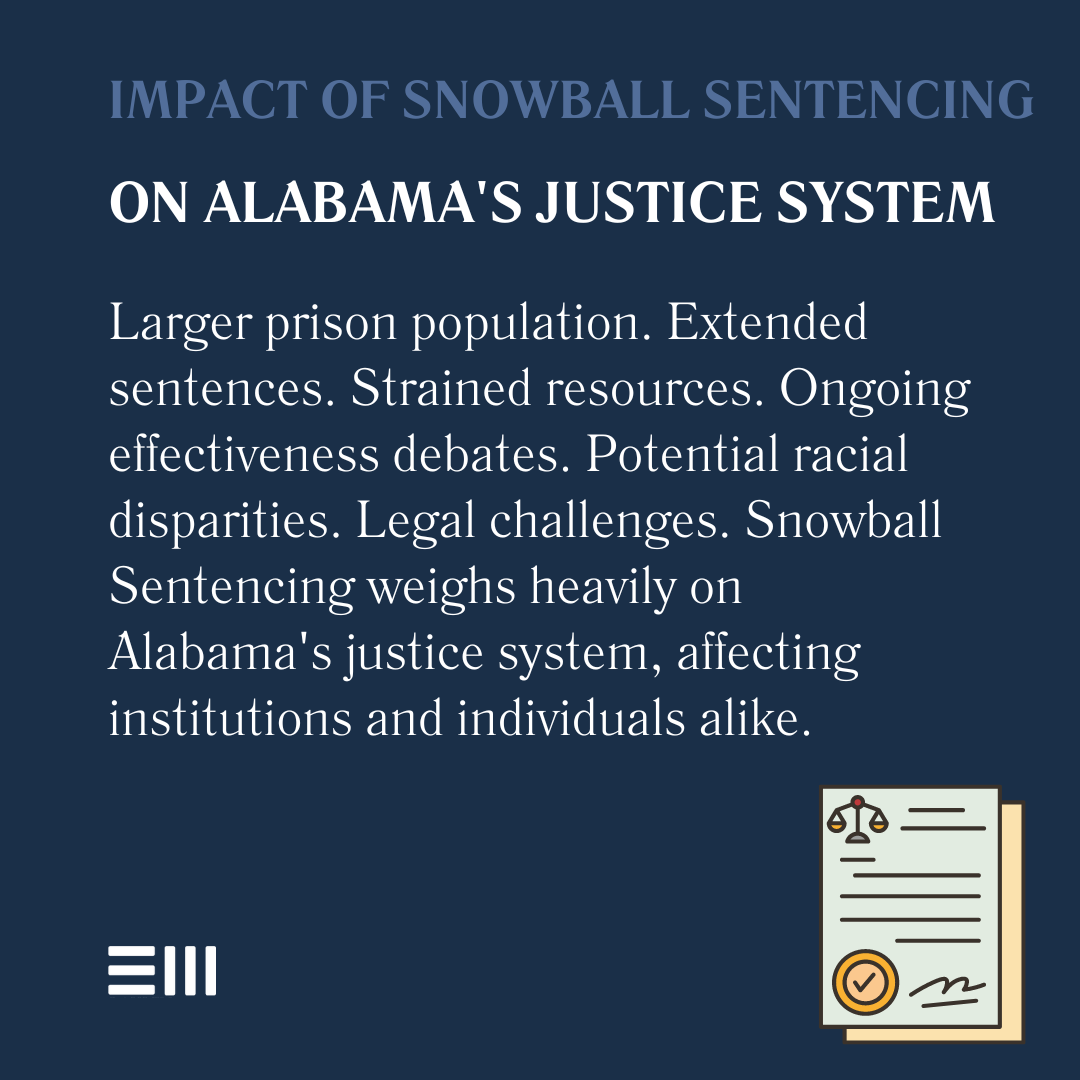Baxley Maniscalco Attorneys At Law
Imagine a snowball rolling down a hill, gathering more snow and momentum as it descends. This analogy aptly describes how sentences under Alabama's Snowball Sentencing law become progressively more severe with each subsequent conviction.
The consequences can be life-altering, turning what might have been a relatively minor offense into a sentence that spans decades.
What Is Snowball Sentencing?
Snowball Sentencing, officially known as the Habitual Felony Offender Act in Alabama, is a law that imposes harsher penalties on repeat offenders.
Like a snowball rolling down a hill, gathering more snow and momentum, the sentences under this act become progressively more severe with each subsequent conviction.
This law was enacted with the intention of deterring repeat offenses and protecting public safety. However, it has also been the subject of considerable debate due to its potential for disproportionate sentencing and its impact on the state's prison population.
Understanding the nuances of Snowball Sentencing is crucial for anyone facing criminal charges in Alabama, especially those with prior convictions.
Let's delve deeper into the specifics of this law and its implications.
How Does Snowball Sentencing Work in Alabama?
The Habitual Felony Offender Act operates on a principle of escalating punishments based on the number of prior felony convictions.
Here's a breakdown of how it typically functions:
- First-time offenders are sentenced according to the standard guidelines for their specific offense.
- For individuals with one prior felony conviction, the minimum sentence for a new felony is typically increased.
- Those with two prior felony convictions face even steeper minimum sentences for subsequent offenses.
- Individuals with three or more prior felony convictions may face life imprisonment or life without parole, depending on the nature of their current offense.
It's important to note that not all prior convictions are treated equally under this law. Factors such as the severity of previous offenses, the time elapsed between convictions, and the nature of the current charge can all influence how the Snowball Sentencing law is applied.
Who Is Affected by Snowball Sentencing?
Snowball Sentencing can potentially affect a wide range of individuals within the Alabama criminal justice system.
Those most likely to be impacted include:
- Repeat offenders with multiple felony convictions;
- Individuals charged with a new felony who have prior convictions on their record;
- People facing charges for relatively minor offenses but who have a history of felony convictions; and
- Juveniles who were previously tried as adults and convicted of felonies.
It's crucial to understand that even if you fall into one of these categories, each case is unique.
The specific circumstances of your situation, including the nature of your current charges and your prior convictions, will play a significant role in determining how the Snowball Sentencing law might apply to you.
The Impact of Snowball Sentencing on Alabama's Criminal Justice System
The implementation of Snowball Sentencing has had far-reaching effects on Alabama's criminal justice landscape.
Let's examine some of the key impacts:
- Increased prison population: The harsher sentences imposed under this law have contributed to a significant growth in Alabama's prison population.
- Longer sentences: Many offenders are serving extended sentences due to the compounding effect of the Habitual Felony Offender Act.
- Strain on resources: The increased prison population has put a strain on the state's correctional facilities and budget.
- Debate on effectiveness: There's ongoing discussion about whether the law effectively deters crime or merely increases incarceration rates.
- Racial disparities: Some studies suggest that the law may disproportionately affect minority communities.
- Legal challenges: The law has faced various legal challenges over the years, leading to some modifications in its application.
Understanding these impacts is crucial for anyone involved in the criminal justice system in Alabama, whether as a defendant, a legal professional, or an interested citizen.
Criticisms and Controversies Surrounding Snowball Sentencing
While proponents argue that Snowball Sentencing enhances public safety by keeping repeat offenders off the streets, the law has faced significant criticism.
Some of the main points of contention include:
- Disproportionate punishments: Critics argue that the law can lead to sentences that are disproportionate to the crime committed, especially for non-violent offenses.
- Limited judicial discretion: The mandatory nature of the sentencing guidelines can restrict judges' ability to consider individual circumstances.
- Impact on rehabilitation: Longer sentences may hinder opportunities for rehabilitation and successful reintegration into society.
- Cost to taxpayers: The increased prison population resulting from this law has significant financial implications for the state.
- Potential for plea bargaining abuse: Some argue that the threat of harsh sentences under this law can be used to pressure defendants into plea deals.
- Questions of constitutionality: There have been legal challenges arguing that aspects of the law violate constitutional protections against cruel and unusual punishment.
These criticisms have led to ongoing debates about the effectiveness and fairness of Snowball Sentencing, with some calling for reform or repeal of the law.
Alternatives to Snowball Sentencing
As debates continue about the effectiveness and fairness of Snowball Sentencing, various alternatives have been proposed or implemented in other jurisdictions.
Some of these include:
- Graduated sentencing: A more nuanced approach that considers the severity and nature of offenses rather than just the number of convictions.
- Rehabilitation-focused programs: Emphasizing treatment and skill-building to address underlying issues that contribute to repeat offenses.
- Community-based alternatives: Programs that allow offenders to serve their sentences while remaining in the community under supervision.
- Restorative justice approaches: Methods that focus on repairing harm caused by the crime and addressing the needs of victims and communities.
- Diversion programs: Initiatives that redirect offenders from traditional criminal justice processes to alternative programs.
- Sentencing guidelines reform: Revising sentencing guidelines to provide more flexibility and consider individual circumstances.
While these alternatives are not currently in place in Alabama, understanding them can provide context for ongoing discussions about criminal justice reform in the state.
Defending Against Snowball Sentencing Charges
If you're facing charges that could fall under the Snowball Sentencing law, it's crucial to mount a strong defense.
Here are some strategies that a skilled defense attorney might employ:
- Challenging prior convictions: Examining the validity and relevance of prior convictions used to enhance the sentence.
- Negotiating plea deals: Working with prosecutors to potentially reduce charges or secure alternative sentencing options.
- Constitutional challenges: Arguing that the application of the law in specific cases violates constitutional rights.
- Mitigating factors: Presenting evidence of rehabilitation, community ties, or other positive factors that could influence sentencing.
- Exploring alternative sentencing options: Advocating for treatment programs or other alternatives to incarceration when appropriate.
- Procedural challenges: Identifying and challenging any procedural errors in the handling of the case.
Remember, every case is unique, and the best defense strategy will depend on the specific circumstances of your situation.
Rights of Individuals Facing Snowball Sentencing
Understanding your rights is crucial when facing potential Snowball Sentencing.
Here are some key rights to be aware of:
- Right to legal representation: You have the right to an attorney, and if you cannot afford one, the court will appoint a public defender.
- Right to a fair trial: You are entitled to a fair and impartial trial by a jury of your peers.
- Right to challenge evidence: You have the right to question the evidence presented against you and to present your own evidence.
- Right to appeal: If convicted, you have the right to appeal your sentence or conviction.
- Protection against double jeopardy: You cannot be tried twice for the same offense.
- Right to know the charges: You must be informed of the specific charges against you and the potential penalties.
These rights are fundamental to ensuring a fair legal process, regardless of your prior convictions or the nature of your current charges.
Frequently Asked Questions About Snowball Sentencing
As you navigate the complex terrain of Alabama's Snowball Sentencing law, you're likely to encounter numerous questions, some of which could have life-changing implications for you or your loved ones.
Let's address some of the most common inquiries we receive about this controversial law.
What Constitutes a Prior Conviction Under Snowball Sentencing?
Under Alabama's Habitual Felony Offender Act, a prior conviction typically refers to any previous felony conviction in Alabama or another jurisdiction. However, the specific details can be complex.
Factors such as the timing of the conviction, the nature of the offense, and whether it was a state or federal crime can all play a role in determining how a prior conviction is treated under this law.
Can Juvenile Convictions Count Towards Snowball Sentencing?
In general, juvenile convictions are not typically counted as prior felonies under the Habitual Felony Offender Act.
However, there are exceptions. If a juvenile was tried and convicted as an adult for a felony offense, that conviction could potentially be used to enhance sentences under the Snowball Sentencing law.
The specifics can vary based on the circumstances of the case and the nature of the juvenile conviction.
How Long Do Prior Convictions Stay on Your Record for Snowball Sentencing Purposes?
Unlike some states that have "washout" periods after which old convictions are no longer considered for sentencing enhancements, Alabama's Habitual Felony Offender Act does not have a time limit on prior convictions.
This means that, in theory, a felony conviction from decades ago could still be used to enhance a sentence under this law.
However, the age of a prior conviction might be considered as a mitigating factor in some cases.
Can Out-of-State Convictions Count Towards Snowball Sentencing?
Yes, out-of-state convictions can potentially be used to enhance sentences under Alabama's Habitual Felony Offender Act.
However, the out-of-state offense must be equivalent to a felony under Alabama law.
This can sometimes lead to complex legal arguments about the comparability of offenses across different jurisdictions.
Fight Harder, Fight Smarter
Understanding Snowball Sentencing is crucial, but navigating its complexities requires expert guidance.
Don't let your future hang in the balance. At Baxley Maniscalco, we're committed to providing the robust defense you need.
Don't wait until it's too late. Contact Baxley Maniscalco today for a confidential consultation.
Let us help you understand your options and fight for your future. Your freedom is worth the call.


